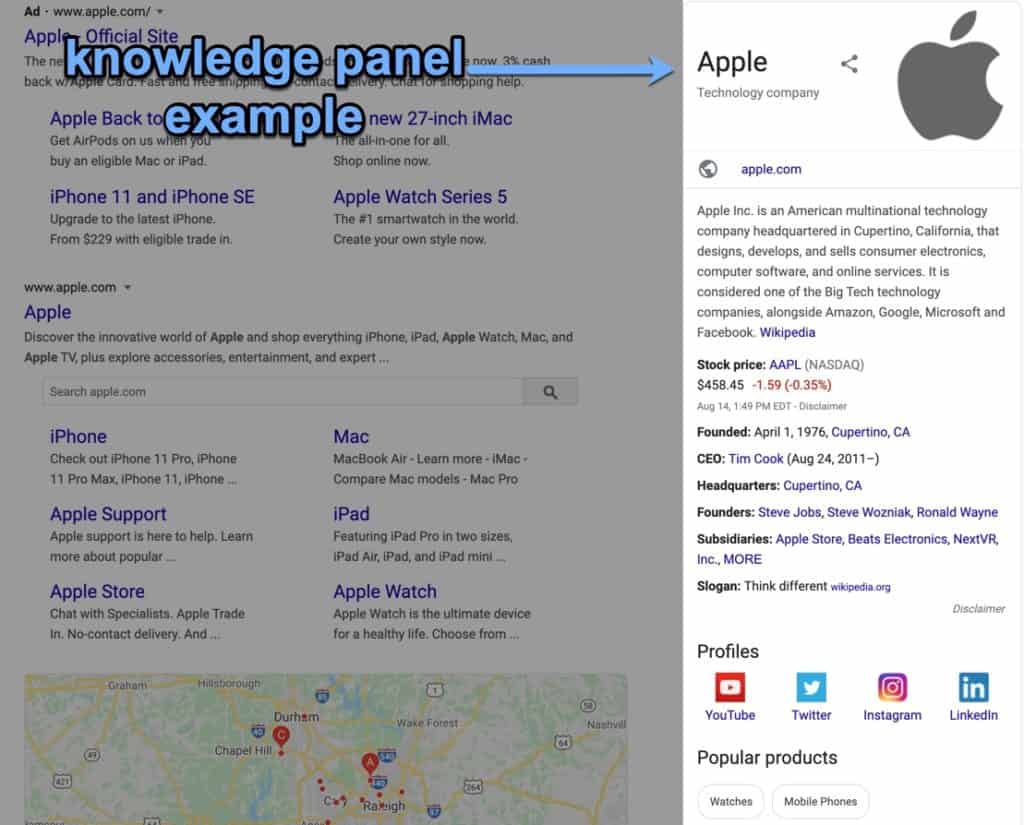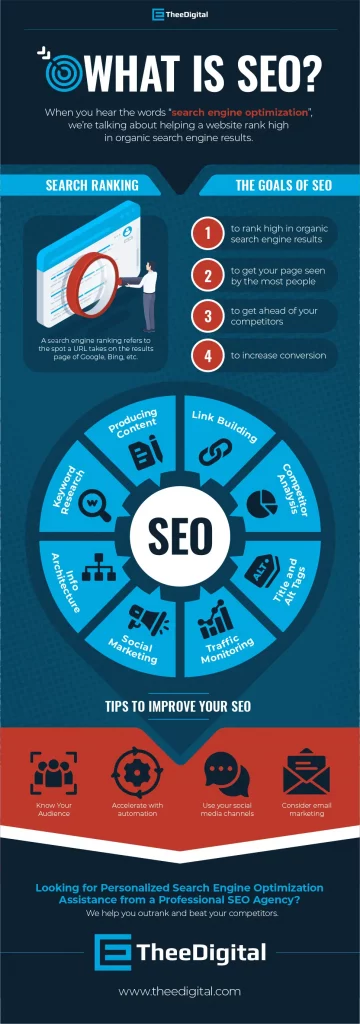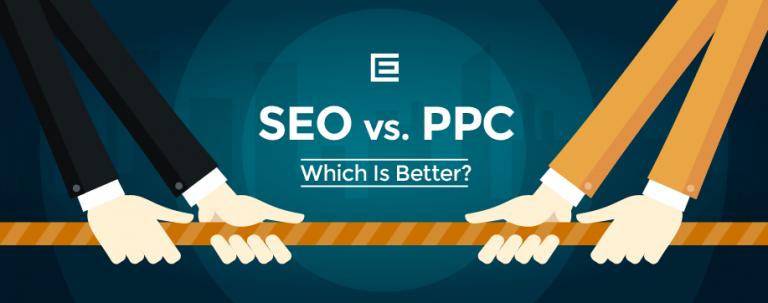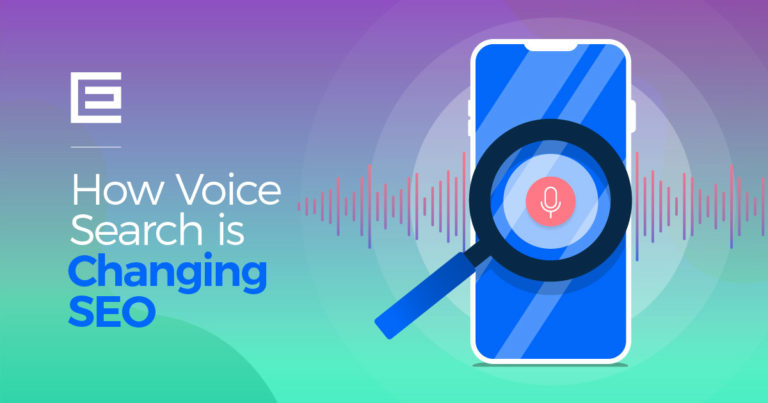At its core, SEO is a multifaceted strategy aimed at enhancing the visibility and ranking of websites in search engine results. It’s not just about sprinkling keywords throughout your site; it’s an intricate dance of quality content creation, website optimization, and understanding the algorithms that drive search engines like Google.
Why SEO Matters in Today’s Digital Ecosystem
The importance of SEO in the digital landscape cannot be overstated. In an age where the internet is the go-to source for almost everything, the visibility of your website in search results can make or break your business. SEO is the linchpin in connecting potential customers with your online presence. It’s about being found in a vast sea of competitors and ensuring that your website not only attracts visitors but also delivers a user experience that converts curiosity into action.
The Power of Visibility
Imagine the internet as a bustling marketplace. Without SEO, your website is like a hidden gem tucked away in a forgotten alley. No matter how extraordinary your content or services might be, they lose value if no one can find them. SEO brings your website to the main street of this digital marketplace. It’s about crafting your online presence so that when someone searches for a product or service you offer, your site appears front and center. This visibility is crucial, as it directly correlates with increased traffic, higher brand credibility, and potentially, more revenue.
Beyond Keywords: A Holistic Approach
Gone are the days when SEO was just about keywords. Today, it encompasses a holistic approach that includes optimizing website speed, ensuring mobile-friendliness, creating valuable content, and building quality backlinks. It’s about understanding user intent, engaging with your audience, and providing solutions to their problems. In essence, SEO has become synonymous with creating a positive and valuable user experience.
Staying Ahead in a Dynamic Digital World
The digital world is dynamic, with search engine algorithms constantly evolving. A robust SEO strategy keeps you ahead of the curve, adapting to these changes and ensuring that your website not only maintains its search ranking but also sets the standard for user experience. It’s an ongoing process of learning, adapting, and evolving to meet the needs of both search engines and users.
In summary, SEO is more than just a marketing tactic; it’s a fundamental component of a successful online presence. It’s about being visible, relevant, and engaging in a digital world where attention is the most valuable currency. Below we delve deeper into the nuances of SEO. Remember that it’s a journey – one that requires patience, persistence, and a keen understanding of the digital landscape.
The Basics of SEO
Decoding SEO: More Than Just Keywords
When we talk about SEO, or Search Engine Optimization, we’re diving into the realm of enhancing a website’s visibility in search engine results. It’s a complex blend of art and science, where the goal is to optimize your website so it speaks the language of search engines like Google, Bing, and others. But it’s not just about getting to the top of search results; it’s about earning your spot there through a website that offers value, relevance, and great user experience.
The Journey of SEO: Adapting to the Digital Evolution
The evolution of SEO is a fascinating story. It started with the simplistic approach of stuffing websites with keywords. However, as search engines evolved, so did SEO. Today, it’s no longer just about keywords. It’s about understanding user intent, providing high-quality content, and ensuring your website is technically sound and user-friendly. Search engines have become smarter, focusing on the relevance and context of content rather than just the presence of specific words. This shift has transformed SEO into a more holistic approach that prioritizes the overall user experience.
SEO vs. SEM: Understanding the Differences
While SEO is a crucial component of online marketing, it’s often confused with SEM, or Search Engine Marketing. To clear the air, SEM is a broader term that includes SEO but also encompasses PPC (Pay-Per-Click) advertising. Think of SEM as the umbrella under which SEO and PPC coexist.
SEO: The Organic Approach
SEO is about organic growth. It’s a long-term strategy focused on building a strong foundation for your website through content, keywords, backlinks, and technical optimization. The beauty of SEO is that it’s about earning your spot in search results, which can lead to sustained traffic over time.
PPC: The Paid Complement
On the other hand, PPC is like a turbo boost for visibility. It involves creating ads and paying for top spots on search engine results pages. While PPC can drive immediate traffic, it’s a short-term strategy that depends on continuous investment. Once you stop paying, the visibility drops.
The Symbiotic Relationship
In the grand scheme of things, SEO and PPC complement each other. While SEO builds a strong organic presence, PPC can be used to target specific keywords or demographics, providing a quick influx of traffic and complementing your organic efforts. The key is to find the right balance between the two, leveraging their strengths to create a comprehensive search engine marketing strategy that drives both immediate and long-term results.
In summary, understanding the basics of SEO is about recognizing its role in the broader context of digital marketing. It’s a blend of technical know-how, content creation, and user experience optimization, all aimed at speaking the language of search engines and users alike. As we continue to explore the intricacies of SEO, remember that it’s a dynamic field, constantly evolving with the digital landscape.
How Search Engines Work
The Inner Workings of Search Engines: Crawling, Indexing, and Ranking
To truly grasp the essence of SEO, it’s important to understand the mechanics of search engines. These digital libraries don’t just magically present information; they follow a meticulous process of discovering, understanding, and organizing web content to deliver the most relevant results to users.
Crawling: The Discovery Phase
Imagine search engines as explorers traversing the vast expanse of the internet. This exploration is known as ‘crawling.’ Search engines deploy bots, often referred to as spiders or crawlers, which scour the web to find new or updated pages. These bots are like digital detectives, following links from known pages to new ones, constantly seeking out fresh content to add to the search engine’s index.
Indexing: Making Sense of the Web
Once a page is discovered, the next step is ‘indexing.’ Think of this as the search engine’s way of processing and organizing information. During indexing, search engines analyze the content of a page, cataloging text, images, and video files, and storing this information in a massive database. This process is akin to a librarian categorizing books in a library, making it easier to find them later.
Ranking: The Art of Prioritization
The final, and perhaps most critical step, is ‘ranking.’ When you enter a query into a search engine, it sifts through its index to provide the most relevant results. This ranking is determined by various factors, including keywords, site usability, and relevance to the user’s query. It’s a complex and ever-changing algorithm that decides which pages appear first, ensuring users find what they’re looking for efficiently and effectively.
Deciphering Search Engine Algorithms
At the heart of these processes lies the search engine algorithm, a set of rules and criteria that determines how pages are ranked. These algorithms are shrouded in secrecy, but they share a common goal: to provide the best possible results for the user’s query. They consider factors like keyword relevance, site structure, user engagement, and hundreds of other signals to rank pages. Understanding these algorithms is a bit like trying to solve a puzzle with ever-changing pieces, requiring SEO experts to stay on their toes and adapt strategies accordingly.
Bots and Indexes: The Unsung Heroes of SEO
When it comes to SEO, bots and indexes play a pivotal role. Bots are the front-line workers, constantly gathering data from websites, while indexes are the storage hubs where this data is kept. For a website to rank well, it must be easily crawlable by bots and correctly indexed. This means having a well-structured website, fresh and relevant content, and ensuring that bots can easily navigate and understand your site. In essence, making your website bot-friendly is a critical step in ensuring it ranks well in search results.
Understanding how search engines work is fundamental to mastering SEO. It’s about appreciating the journey from crawling and indexing to ranking, and recognizing the importance of aligning your website with the intricate workings of search engine algorithms. As we delve deeper into the nuances of SEO, remember that at its core, it’s about making your website both user-friendly and search engine-friendly.
Types of SEO
Exploring the various aspects of SEO is crucial for maximizing your website’s performance in search engine rankings. We’ll focus on its three primary components: Technical SEO, On-Page SEO, and Off-Page SEO, each contributing significantly to strengthening your website’s online visibility.
Technical SEO: The Foundation of Your Digital House
Think of Technical SEO as the foundation and framework of your digital house. It’s all about the behind-the-scenes aspects that make your website appealing not just to users, but to search engine crawlers as well.
Site Architecture: A Blueprint for Success
Site architecture refers to how your website is structured. A well-organized site with a logical hierarchy not only enhances user experience but also makes it easier for search engines to crawl and index your content. Imagine a well-organized library where every book is easy to find – that’s what good site architecture does for your website.
Performance: Speed and Efficiency
In the fast-paced digital world, speed is king. Technical SEO emphasizes the importance of page speed and overall site performance. A slow-loading site can be a major turn-off for visitors, and search engines know this. Ensuring your website loads quickly and runs smoothly is like making sure the doors and windows of your digital house open effortlessly.
On-Page SEO: Crafting Quality Content
Moving inside our digital house, On-Page SEO focuses on the content that your visitors will see and interact with. It’s about making sure that each page on your website is an invitation to stay and explore.
Content Relevance: Meeting User Needs
At the heart of On-Page SEO is content relevance. Your content should not only be engaging but also answer the questions your audience is asking. It’s like hosting a dinner party and making sure the conversation topics are interesting and relevant to all your guests.
Quality: More Than Just Keywords
Gone are the days when stuffing keywords into your content would suffice. Now, it’s about quality – well-written, informative, and valuable content. This includes using the right keywords naturally, creating compelling meta tags, and ensuring your content is up-to-date. High-quality content is like serving a gourmet meal at your dinner party – it’s what keeps guests coming back for more.
Off-Page SEO: Building Your Website’s Reputation
Finally, stepping outside our digital house, Off-Page SEO is about building your website’s reputation in the wider digital neighborhood. It’s the external factors that influence your site’s standing in the digital world.
Building Authority: Earning Trust and Links
Authority is built through links from other reputable sites. Think of each link as a vote of confidence or a referral from a neighbor. The more high-quality links you have pointing to your site, the more trustworthy and authoritative your site appears to search engines.
Trust: The Currency of the Digital World
Trust is the currency in the digital world, and Off-Page SEO helps you earn it. This includes managing your online reputation, engaging on social media, and getting mentioned on other reputable websites. It’s like being a well-respected member of your community – the more people speak highly of you, the more others will want to visit your digital home.
Understanding the different types of SEO is crucial in creating a comprehensive strategy for your website. From the technical groundwork to the quality of your on-page content and the authority you build off-page, each element plays a vital role in your website’s search engine success. As we delve deeper into the world of SEO, remember that it’s a blend of these three key types that will help your website stand out in the crowded digital landscape.
SEO Strategies and Best Practices
Navigating the world of SEO can sometimes feel like trying to solve a complex puzzle. However, with the right strategies and best practices, you can effectively enhance your website’s visibility and ranking. Let’s dive into some key areas: Keyword Research and Optimization, Content Creation and Optimization, Link Building, Mobile Optimization, and Local SEO.
Keyword Research and Optimization: The Starting Point
Unearthing the Right Keywords
At the heart of SEO lies keyword research. It’s like being a detective, uncovering the terms and phrases your potential customers are using to search for services or products like yours. This process involves not just identifying popular search terms, but also understanding the intent behind them. Are people looking for information, trying to make a purchase, or comparing products? Tools like Google Keyword Planner or SEMrush can be invaluable in this quest.
Sprinkling Keywords Wisely
Once you’ve identified your keywords, the next step is optimization. This doesn’t mean cramming your content with as many keywords as possible; rather, it’s about strategically placing them where they’ll have the most impact. This includes titles, meta descriptions, headers, and naturally within your content. It’s like seasoning a dish – just enough to enhance the flavor without overwhelming it.
Content Creation and Optimization: The Heart of SEO
Crafting Valuable Content
Content is king in the world of SEO. But not just any content – it needs to be high-quality, informative, and engaging. Your content should answer your audience’s questions, solve their problems, and provide value. This could be through blog posts, videos, infographics, or podcasts. Remember, great content not only attracts search engines but also keeps visitors coming back.
Fine-Tuning for Optimization
Creating content is just the first step. Optimization involves ensuring your content is readable, uses keywords effectively, and provides a great user experience. This includes using short paragraphs, bullet points, and multimedia elements to break up text. It’s about making your content not just informative but also enjoyable to consume.
Link Building: Focusing on Quality
The Art of Earning Links
Link building is a crucial part of SEO, but it’s quality, not quantity, that counts. Think of each link to your site as a vote of confidence. Earning links from reputable, high-authority sites is far more beneficial than numerous links from lesser-known sources. Techniques like guest blogging, creating shareable infographics, or producing compelling case studies can help attract these valuable links.
Mobile Optimization: Catering to the On-the-Go User
Embracing Mobile-First
With more people than ever using mobile devices to access the internet, mobile optimization is no longer optional. This means having a responsive design that adjusts to different screen sizes, ensuring fast loading times, and making navigation easy on a smaller screen. It’s about providing a seamless experience, whether a user is on a desktop or a smartphone.
Local SEO: Connecting with Local Audiences
The Power of Local Presence
For businesses serving specific areas, local SEO is key. This involves optimizing your website for local search queries, creating a Google My Business account, and ensuring your business details are consistent across the web. It’s also about gathering local reviews and engaging with the local community through events or local content. Local SEO is like being a well-known and trusted neighbor in your community.
Effective SEO is a blend of various strategies and best practices. From the precision of keyword research to the creativity of content creation, the strategic approach of link building, the necessity of mobile optimization, and the targeted efforts of local SEO, each element plays a vital role in the success of your online presence. As you implement these strategies, remember that SEO is an ongoing process, requiring constant tweaking and adaptation to the ever-changing digital landscape.
Measuring SEO Success
Measuring success is crucial to understanding the impact of your strategies and making informed decisions for future improvements. Let’s explore the key performance indicators (KPIs), tools, and techniques essential for tracking SEO performance, and the importance of continuous improvement in your SEO journey.

Key Performance Indicators (KPIs) for SEO: Your SEO Scorecard
Identifying What Matters Most
KPIs in SEO are like a scorecard that tells you how well your website is playing the game of search engine rankings. These metrics help you gauge the effectiveness of your SEO efforts and guide your strategy. Some essential KPIs include:
- Organic Traffic: The number of visitors coming to your site through search engines. It’s a direct reflection of your SEO effectiveness.
- Keyword Rankings: Where your keywords rank on search engine results pages (SERPs). Higher rankings usually lead to more traffic.
- Click-Through Rate (CTR): The percentage of users who click on your link after seeing it in the search results. It indicates how compelling your page titles and meta descriptions are.
- Bounce Rate: The percentage of visitors who leave your site after viewing only one page. A high bounce rate might suggest that your content isn’t resonating with your audience.
- Conversion Rate: How often visitors complete desired actions, like signing up or making a purchase. It measures the effectiveness of your website in turning visitors into customers.
Tools and Techniques for Tracking SEO Performance: Your SEO Toolkit
Harnessing the Power of Analytics
To effectively track these KPIs, you need the right tools and techniques. Here’s where SEO analytics tools come into play:
- Google Analytics: A fundamental tool for tracking organic traffic, user behavior, and conversions. It helps you understand how visitors interact with your site.
- Google Search Console: Offers insights into your site’s presence in Google SERPs, including keyword performance, click-through rates, and indexing issues.
- SEO Platforms like SEMrush or Ahrefs: Provide comprehensive data on keyword rankings, backlink profiles, and competitor analysis.
- Heat Mapping Tools: Tools like Crazy Egg or Hotjar show you how users interact with your pages, which can be invaluable for improving user experience.
Going Beyond the Surface
While these tools provide data, the real skill lies in interpreting this information. It’s about understanding the story behind the numbers – why certain pages perform well, what drives users to convert, and where there might be gaps in your SEO strategy.
Continuous Improvement in SEO Strategies: The Path to SEO Mastery
Adapting to the Ever-Changing SEO Landscape
SEO isn’t a set-it-and-forget-it strategy. It requires ongoing attention and adaptation. Here’s how you can ensure continuous improvement:
- Regular Audits: Conducting SEO audits regularly helps identify areas of improvement, whether it’s on-page optimization, content updates, or technical fixes.
- Staying Updated with Algorithm Changes: Search engines constantly update their algorithms. Keeping abreast of these changes and adjusting your strategy accordingly is crucial.
- Testing and Experimentation: Implement A/B testing for different SEO elements like meta descriptions, page titles, or content formats to see what works best.
- Learning from Analytics: Regularly review your analytics data to understand user behavior and trends. Use these insights to refine your content and SEO strategies.
Embracing a Culture of Learning
Finally, remember that SEO is as much about learning and adapting as it is about implementing. Stay curious, keep learning, and always be ready to tweak your strategies based on performance data and industry trends.
Measuring SEO success is about setting the right KPIs, leveraging powerful tools to track your performance, and constantly refining your strategies based on data-driven insights. It’s a continuous journey of learning, adapting, and growing in the ever-evolving world of SEO.
Common SEO Challenges and Solutions
Navigating the SEO landscape can sometimes feel like steering a ship through ever-shifting seas. The challenges are many, but with the right approach, they can be transformed into opportunities for growth and improvement. Let’s explore some common SEO hurdles and how to effectively overcome them.
Staying Updated with Algorithm Changes: Keeping Pace with Search Engines
Riding the Wave of Change
One of the most daunting aspects of SEO is keeping up with the frequent changes in search engine algorithms. These updates can sometimes turn a well-optimized site upside down, causing fluctuations in rankings and traffic.
Solutions for Staying Agile
- Stay Informed: Regularly follow SEO news sources, blogs, and forums. Platforms like Moz, Search Engine Journal, and Google’s own blog are great for staying updated.
- Adapt Quickly: When an update rolls out, be ready to analyze its impact on your site and adapt your strategy accordingly. This might involve tweaking your content, adjusting your keywords, or even overhauling your site structure.
- Focus on Fundamentals: Despite the changes, certain SEO fundamentals remain constant, such as creating high-quality content and providing a good user experience. Focusing on these can provide stability amidst the changes.
Balancing SEO with User Experience: Striking the Right Chord
The Tightrope Walk
SEO isn’t just about pleasing search engines; it’s equally about catering to the people who visit your website. Sometimes, what’s good for SEO can clash with user experience (UX), leading to a site that ranks well but doesn’t convert visitors into customers.
Harmonizing SEO and UX
- User-Centric Content: Create content that’s not only keyword-rich but also informative, engaging, and valuable to your audience.
- Site Navigation and Structure: Ensure your site is easy to navigate. A well-structured site with a clear hierarchy improves both SEO and user experience.
- Page Speed Optimization: Fast-loading pages are crucial for both SEO and UX. Regularly test your site’s speed and implement necessary optimizations, like compressing images and minimizing code.
Overcoming Technical SEO Challenges: Navigating the Backend Complexities
The Technical Maze
Technical SEO can be complex, involving aspects like site architecture, mobile responsiveness, and indexability. Issues in these areas can hinder your site’s ability to rank well.
Solutions for Technical Proficiency
- Regular Audits: Use tools like Google Search Console or SEMrush for regular technical audits. Identify and fix issues like broken links, crawl errors, or unoptimized images.
- Mobile Optimization: With mobile-first indexing, ensuring your site is mobile-friendly is non-negotiable. Use responsive design and test your site on various devices.
- Collaborate with Developers: Work closely with your web development team to address technical issues. Clear communication about SEO goals and technical requirements is key.
While the challenges in SEO are real and ever-present, they are not insurmountable. Staying informed and adaptable, balancing SEO with a stellar user experience, and tackling technical issues head-on can help you navigate these challenges successfully. Remember, in the world of SEO, challenges are just opportunities in disguise, pushing you towards becoming more adept and resilient in your SEO strategies.
The Future of SEO
As we look ahead into the ever-evolving world of SEO, it’s clear that staying ahead of the curve is not just beneficial – it’s essential. The future of SEO is shaping up to be an exciting journey, marked by rapid advancements and emerging trends. Let’s delve into what these developments might entail and how we can prepare for the challenges they bring.
Navigating Emerging Trends in SEO
Voice Search: Talking the Talk
One of the most significant shifts in SEO is the rise of voice search. With the increasing popularity of virtual assistants like Siri, Alexa, and Google Assistant, more people are using voice commands for their search queries. This trend is changing the way we think about keywords and content optimization.
- Conversational Keywords: As voice searches are typically more conversational and natural-sounding, incorporating long-tail keywords and phrases that mimic how people talk will become crucial.
- Local SEO Emphasis: Voice searches often involve looking for local services or businesses, so strengthening local SEO strategies will be more important than ever.
AI and Machine Learning: The Smart SEO
Artificial Intelligence (AI) and machine learning are not just buzzwords; they’re revolutionizing SEO. Search engines are increasingly using AI to provide more accurate, personalized search results.
- User Intent Focus: AI’s ability to understand user intent means that content will need to be more targeted and relevant than ever.
- Predictive Analysis: Leveraging AI for predictive analysis can help anticipate market trends and user needs, allowing for more proactive SEO strategies.
Preparing for Future SEO Challenges
Staying Agile in a Dynamic Landscape
The future of SEO will require adaptability and a willingness to embrace new technologies and methodologies. Here’s how we can prepare:
- Continuous Learning: The field of SEO is constantly evolving. Staying informed about the latest trends and algorithm updates is key.
- Embracing New Technologies: Be open to integrating new technologies like AI tools or voice search optimization into your SEO strategy.
- Data-Driven Strategies: Utilize analytics and data to guide your SEO decisions. Understanding user behavior and preferences will be crucial in tailoring effective SEO strategies.
Building a Future-Proof SEO Foundation
While it’s important to adapt to new trends, some timeless SEO principles will always remain relevant:
- Quality Content: No matter how much technology evolves, high-quality, valuable content will always be at the heart of good SEO.
- User Experience (UX): A website that offers a great user experience will stand the test of time. This includes fast loading times, mobile-friendliness, and intuitive navigation.
- Ethical SEO Practices: As search engines become smarter, the importance of using ethical, white-hat SEO techniques cannot be overstated. Shortcuts and black-hat tactics will not only become ineffective but can also harm your site’s reputation and rankings.
By embracing emerging trends like voice search and AI, staying informed and adaptable, and sticking to the timeless principles of quality content and great user experience, we can navigate the future of SEO confidently. The key is to keep learning, experimenting, and evolving along with the ever-changing world of SEO.
FAQs
What is the Difference Between SEO and SEM?
SEO vs. SEM: Different Paths to a Common Goal
- SEO: This is all about organic strategies. It involves optimizing your website to rank higher in search engine results pages (SERPs) without paying for placement. It’s a long-term approach, focusing on creating quality content, optimizing keywords, and building a user-friendly website.
- SEM: This is a broader term that includes SEO but extends to paid strategies, primarily Pay-Per-Click (PPC) advertising. SEM encompasses both the organic reach of SEO and the paid reach of PPC to increase a website’s visibility in SERPs.
In essence, while SEO focuses solely on organic growth, SEM uses both organic and paid tactics to boost visibility.
How Long Does It Take to See Results from SEO?
The SEO Marathon: A Test of Patience and Persistence
One of the most common and challenging questions in SEO is about the time frame for seeing tangible results. SEO is often likened to a marathon, not a sprint.
- Time Frame: Generally, noticeable results from SEO efforts can take anywhere from six months to a year. This timeline can vary based on the competitiveness of your industry, the current state of your website, and the effectiveness of your SEO strategy.
- Continuous Process: It’s important to understand that SEO is an ongoing process. Search engines are continually updating their algorithms, and competitors are always optimizing, so your SEO efforts need to be consistent and evolving.
Can I Do SEO on My Own or Should I Hire a Professional?
DIY SEO vs. Professional Expertise
Deciding whether to tackle SEO on your own or hire a professional depends on various factors, including your skill level, the complexity of your website, and the competitiveness of your industry.
- DIY SEO: If you have a basic website and the time to learn SEO fundamentals, you can start with a DIY approach. There are plenty of resources and tools available online to guide you.
- Professional Help: For larger, more complex websites, or if you’re in a highly competitive industry, hiring an SEO professional or agency might be a more effective approach. They bring expertise, experience, and resources that can significantly impact your website’s performance.
How Often Should I Update My SEO Strategy?
The Art of Adapting: Keeping Your SEO Strategy Fresh
SEO is not a set-it-and-forget-it strategy. The digital landscape is constantly evolving, and so should your SEO approach.
- Regular Reviews: It’s advisable to review your SEO strategy at least quarterly. This doesn’t always mean a complete overhaul but rather tweaking and adjusting to align with new trends, algorithm updates, and changes in user behavior.
- Responsive Adjustments: Be prepared to make more frequent adjustments in response to significant algorithm updates by search engines or shifts in your industry.
Final Thoughts
SEO is more than just a set of techniques; it’s the backbone of your online presence. In the vast ocean of digital content, SEO is the beacon that guides users to your website. It’s about ensuring that when someone searches for a product or service you offer, your site appears prominently in the search results. This visibility is crucial, as it directly correlates with increased traffic, enhanced brand credibility, and, ultimately, higher conversion rates.
A Long-Term Asset for Your Business
Unlike other marketing strategies that offer quick but fleeting results, SEO is a long-term asset. It builds upon itself over time, meaning the work you do today will continue to benefit your business in the future. It’s about laying a foundation of quality content, robust site architecture, and user-centric experiences that stand the test of time and algorithm changes.
Embracing SEO for Future-Proofing Your Business
The Path to Sustainable Online Success
Adapting and embracing SEO is not just a choice but a necessity for sustainable success. It’s about understanding that SEO is an ongoing journey, not a destination. The digital landscape will continue to change, and your SEO strategies should evolve accordingly.
Invest in Your Digital Future
If there’s one takeaway from our journey through SEO, it’s this: invest in your digital future. Whether you’re a small business owner, a blogger, or part of a large corporation, SEO is the key to unlocking your online potential. By embracing SEO, you’re not just chasing short-term gains; you’re building an online presence that will continue to drive traffic, generate leads, and grow your business for years to come.
Get Help Request a Free Website Audit
Hopefully you now have a better understanding of SEO
If you want to improve your website performance or want to fix all of your technical SEO issues, request a free website audit with us.
Tags: Questions & Answers









